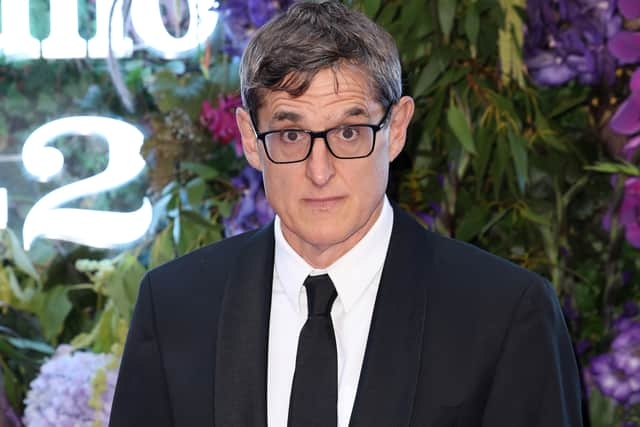Louis Theroux gives stern warning for BBC over ‘no-win’ situation during Edinburgh TV festival MacTaggart talk
and live on Freeview channel 276
Louis Theroux has warned the BBC is in a “no-win” situation of trying to “avoid offence” and is making it harder for risky programmes to be made in a bid to “play it safe”.
Speaking at the annual MacTaggart lecture at the Edinburgh TV Festival, the 53-year-old documentary film maker who is best known for covering controversial topics including pornstars, neo-nazis, gangs and mega jails reflected on his own career which has seen him “investigating worlds viewed as stigmatised or controversial”.
Advertisement
Hide AdAdvertisement
Hide AdTheroux explained that: “Often the stories made me nervous. They felt risky."
He added: “But it was also true that those shows that had real moral complexity to them were the ones that worked best. The less morally fraught episodes - the ones that were safer - haven’t aged so well.”
Theroux questioned whether such programmes “might be harder to get commissioned” today, reflecting on the impact of social media and viral influencers compared to the BBC and quoting the words of George Orwell - “If liberty means anything at all, it means the right to tell people what they do not want to hear”, which can be seen at BBC Broadcasting House.


Reported by BBC News, Theroux revealed that the “mood” has changed. He told the Edinburgh Film Festival: “Lately, the mood has changed. By and large, that is a good thing. We are more thoughtful about representation, about who gets to tell what story, about power and privilege, about the need not to wantonly give offence. I am fully signed up to that agenda.”
Advertisement
Hide AdAdvertisement
Hide AdBut he queried if the aim of not offending has created “an atmosphere of anxiety” which leads to “less confident, less morally complex filmmaking.” Adding: “As a result, programmes about extremists and sex workers and paedophiles might be harder to get commissioned.”
Theroux explained that at the BBC there was now an urge to “play it safe”, he said: “From working so many years at the BBC, and still making programmes for the BBC, I see all too well the no-win situation it often finds itself in. Trying to anticipate the latest volleys of criticisms. Stampeded by this or that interest group. Avoiding offence.
“Often the criticisms come from its own former employees, writing for privately owned newspapers whose proprietors would be all too happy to see their competition eliminated. And so there is an urge to lay low, to play it safe, to avoid the difficult subjects.”
He called for television that is “confrontational, surprising and upsetting”, and urged producers: “Take risks. Sail close to the wind.”
Advertisement
Hide AdAdvertisement
Hide AdThe documentary maker also addressed the two programmes he made with disgraced TV presenter Jimmy Saville, one in 2000 before his crimes had been revealed and one in 2016 after his death. He said: “I was among many examining their consciences to figure out if there was anything I could have done differently. In making a second programme, I wanted to do justice to the scale of the harm he had caused. That, in itself, felt like a lot of pressure.
“But alongside it was a further concern that was, if anything, more worrying. The outrage at his crimes was so convulsive, there was also an urge to depict them in ever more lurid terms. It’s in the backwash of huge moral outrages because they are so emotive that truth often gets lost. Sometimes that’s where it’s hardest to hold your nerve and take the risk of remaining calm.”
Theroux added that it has been “fascinating and a little dispiriting but maybe not that surprising” to see how Savile’s crimes have been used by some on the right and far right “to tarnish the BBC”. He continued: “In the fever swamps of the internet, Jimmy Savile has become a meme. A convenient and easy shorthand to discredit and besmirch the BBC and anyone who works there.
“It isn’t brave and risky to be inflammatory. What is brave is to not get swept along. Not to jump to conclusions, not to cast blame too broadly, not to pander to prejudice, to resist the easy wins of playing to an angry crowd.
“The risk if we don’t do that is even greater. We become no better than the trolls on social media and render ourselves irrelevant.”
Comment Guidelines
National World encourages reader discussion on our stories. User feedback, insights and back-and-forth exchanges add a rich layer of context to reporting. Please review our Community Guidelines before commenting.
